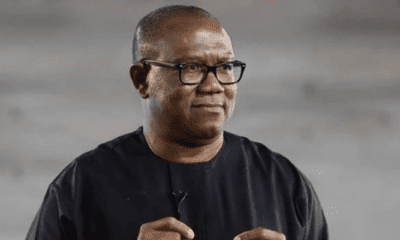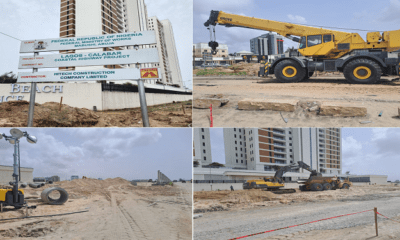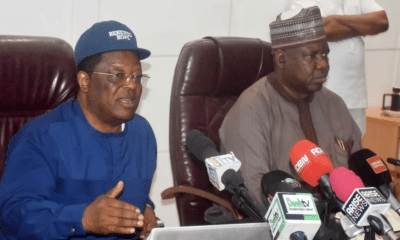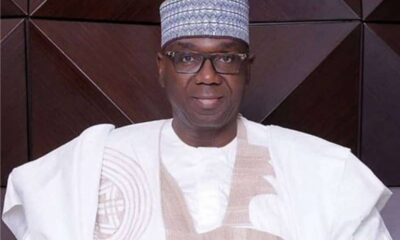Opinion
The transformative power of Lagos-Calabar Coastal superhighway

By Temitope Ajayi
Barely a month after the Federal Executive Council approved the construction of the Lagos-Calabar Coastal superhighway, the contractor has moved to site to build what will be a monumental civil engineering project that Nigeria has ever seen.
Since the construction of the iconic Third Mainland Bridge that stretched over 11 kilometres across the lagoon, the Lagos-Calabar Coastal road will usher in a new era of ambitious road infrastructural development projects in Nigeria.
The Third Mainland Bridge, one of the longest bridges in the world, started during the administration of President Shehu Shagari in 1980. It was completed 10 years after, in 1990, by the military administration of President Ibrahim Babangida.
When completed, the 700km long coastal highway will also enter the world record books among iconic coastal routes like the Wild Atlantic Highway in Ireland and the Pacific Coastal Highway in the United States.
The first phase of the new 700km highway that will run through the nine coastal states is the 47.47km section beginning from Victoria Island. It has five lanes on each side of the dual carriageway and a train track in the middle.
The superhighway is being built by Hitech Construction Company. Part of the funding will be sourced by Hitech, the contractors.
Starting from Ahmadu Bello Way, Victoria Island in Lagos, the Coastal road will pass through Lekki Deep Seaport, Ogun, Ondo, Delta, Bayelsa, Cross River and Akwa-Ibom States. At a recent press briefing, Minister of Works, Senator David Umahi, said the Coastal road would have two spurs that will link up with Northern Nigeria to further integrate the North and South in terms of movement of the people, goods and services.
Economic analysts have revealed that the completion of the first phase of the project alone could increase the size of Lagos State economy by 50 percent because of the connection to Lekki Deep Seaport and the Lekki economic corridor where Dangote Refinery and Petrochemical Complex is situated alongside other multinational industries.
One of the fascinating and interesting features of the coastal road is how it will compress the distance between Lagos and Ondo State. For instance, the distance from Ibeju-Lekki in Lagos to Araromi in Ondo State is about 50 kilometres along the coast. This distance translates to about an hour’s journey. From Araromi to Ore, a major connecting hub in Ondo State is about another 50 kilometres, whereas the existing route from Ibeju-Lekki to Ore currently in use by motorists is 150 kilometres.
Speaking on the game-changing effect of the coastal road and how it will transform the economy of Cross River State, the Commissioner of Information,
Erasmus Ekpang, in a press statement, said the state government is overwhelmingly grateful to President Bola Tinubu for embarking on the project decades after the necessity for the coastal road had been muted.
The highway, according to the Commissioner, “will serve as a catalyst to transform the economy of Cross River State for optimum impact. I want to applaud President Tinubu for the political will to translate this lofty dream into concrete reality.
“This coastal highway is going to be a game changer for the socio-economic status of Cross River. It is bound to add value to our rich agricultural produce while enhancing the profit base of local farmers. The benefits in the value chain are unimaginable.”
Mr. Ekpang further averred that the highway would boost the tourism economy of Cross River.
“When completed, the road will also boost tourism traffic to our unique tourism sites by attracting an unprecedented number of tourists, given the thrills and frills synonymous with road travel.”
Speaking in like manner, Chairman of the All Progressives Congress in Cross River, Alphonsus Eba, praised President Tinubu for fulfilling a key aspect of his campaign promises to the people of Cross River.
“President Tinubu has once again demonstrated that he is a man of his word by keeping to his promise. When Senator Ben Ayade voiced this request during the presidential campaign in Calabar, he knew the economic importance of the road.
“Nothing is more gratifying at the moment than the cheering news of the commencement of the highway. This is a huge boost to the current drive of Governor Bassey Otu to alter the socio-economic narrative of our state. The highway is bound to ensure our rapid transformation in all facets of economic development by driving traffic of investors and tourists,” the state party Chairman noted.
While many Nigerians are excited that the road project has finally taken off after many years, that the highway is starting now speaks to the capacity of President Tinubu to conceive bold ideas and take on huge and transformational projects. President Tinubu’s penchant for high impact projects preceded his presidency.
As Governor of Lagos State from 1999 to 2007, he superintended over the financial and infrastructural renewal of the state. Apart from the major road projects his administration in Lagos undertook and completed, he set up Lagos Metropolitan Area Transport Authority (LAMATA) to modernise public transportation systems in the state through intermodal public transport infrastructure.
The Red and Blue Rail Metro lines that were recently commissioned formed part of the grand vision he laid down for the state. The Lekki Deep Seaport, Lekki Free Trade Zone, and Eko Atlantic City projects are landmark projects that will eternally bear the footprints of President Tinubu as governor of Lagos State for eight years. Also imminent for implementation is the 4th Mainland Bridge, conceived during the Tinubu era in Lagos.
Indeed, like his many impactful achievements in Lagos, the coastal highway will be one of the many critical transformative economic projects that will hallmark Tinubu’s presidency.
Ajayi is Senior Special Assistant to President Tinubu on Media & Publicity
Opinion
Are youths the panacea for Nigeria’s problems?
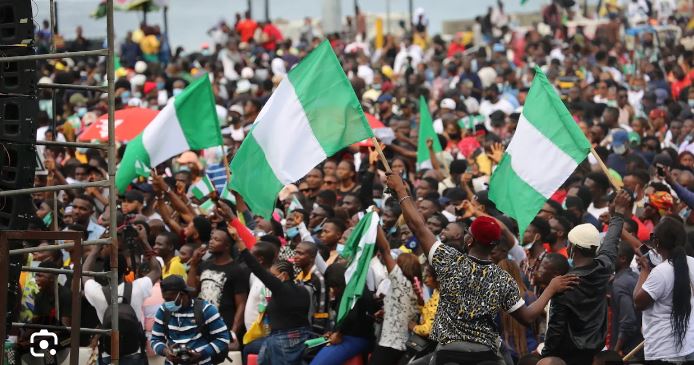

By Temitope Tbog Omoakhalen
In 2021, after the COVID-19 pandemic, my husband and I engaged in a pet project that required us conducting candid interviews with people on the streets to gain insight into their perceptions of Nigeria, their expectations of government and their sense of ownership of a Nigerian dream. It was an interesting season of my life that afforded me the opportunity to just hear first-hand what everyday Lagosians were thinking. There was an encounter with a young lady, however, that left an indelible mark on my consciousness. She said to me, “TBOG, at the tender age of six, I was called ‘the leader of tomorrow’. I just turned forty, yet, the promise of tomorrow still eludes me. When will my tomorrow come?” Her words touched me deeply because it echoed a sentiment shared by many who have long been called, THE LEADERS OF TOMORROW. “When will our collective tomorrow materialise, and what form will it assume?” many youths ask.
For a long time, the youth have been told to wait for their turn to lead the nation. As the years have passed and the vista of tomorrow appears distant, one cannot help but question the accuracy of the ‘waiting period.’ Will the youth ever have their turn at power, or will it have to be forcefully grabbed? Are youths even ready to handle the reins of power or are we just too inexperienced to know what to do with it? Would Nigeria progress as a nation if it had an infusion of youthful energy to invigorate governance structures or would our much-touted inexperience cause us to falter under pressure, make costly mistakes, or succumb to the allure of power without proper accountability? If they had the opportunity, would the current crop of youths be any different from the older generation of leaders they fiercely condemn or would they become the breath of fresh air Nigeria needs? While these are burning questions on the minds of many, I am compelled to take Lagos, once again, as my model.
Lagos State boasts of the most vibrant and dynamic population of young people in the country. Many of Nigeria’s young leaders and change-makers have their roots in Lagos, the likes of Iyinoluwa Aboyeji, Olugbenga Agboola, Folarin Falana (Falz), Debo Adedayo (Mr. Macaroni), Tunde Onakoya, Hilda Baci, Debola William, Chude Jideonwo, Yemi Adamolekun among others who are all thriving in their various spheres of influence, from technology to arts and entertainment to media to civil society, placing Nigeria in global conversations. This suggests that the youth have the potential to make a difference if given the opportunity in the political arena. Thankfully, the current Minister of Communications, Innovation and Digital Economy, Dr Bosun Tijani, is a young Nigerian whose inspiring story is traceable to the Centre of Excellence. Moreover, did you know that in Governor Babajide Sanwo-Olu’s cabinet, there are young people in their thirties holding key positions? Some of his Senior Special Assistants were in their twenties when he took office and they have since grown to head agencies within the state, contributing their quota to the decision-making process. For these ones, their tomorrow has come; they have become the leaders of today.
Mr. Governor recognises the untapped potential of youth and is committed to investing in this potential. No wonder the Lagos model is a departure from the longstanding tradition of political leadership dominated by the older generation. The Lagos model is a definite paradigm shift in governance dynamics. This should not be very surprising given that Lagos is a forward-thinking state driven by the THEMES+ agenda. Besides, Lagos has historically provided an enabling environment for young people to thrive across various sectors even as the political environment has been characterised by intergenerational integration and continuity of vision. This is a commendable model that other states must consider adopting. While there are indicators of increased youth participation in several states across the nation, to accurately measure inclusion, a Youth Participation Index that evaluates the gains of the Not-Too-Young-To-Run Act and the involvement of youth in appointive positions would be a valuable additional contribution from civil society groups. While I believe that Lagos State would top such an index, I recognise that there is still much room for progress in the inclusion of young people in public leadership across the nation.
Among public officials, there are two schools of thought on youth involvement in public leadership. On the one hand, there is the belief that incorporating youth in politics and governance would trigger a positive disruption through the introduction of innovative ideas, digital savvy, and a deeper connection with contemporary issues facing the populace. This school of thought holds that the idealism of youth as well as our passion for change offers a promising antidote to stagnant bureaucracies and the entrenched systems that currently impede transformative outputs. This school of thought further holds the opinion that since many among the present-day older generation of leaders began their leadership journeys as youths, it would be only just for them to yield the floor to the present-day younger generation. On the other hand, there are those who hold sacred the age-old wisdom of experience. The holders of this opinion argue that governance is a complex matter requiring the nuanced understanding and institutional knowledge that can only be found among seasoned politicians and administrators. They believe that youthful idealism could become a pitfall without practical wisdom gained through years of service and leadership.
My thoughts regarding these two positions are very simple. Leadership is a skill that must be forged in the crucible. I do not think that the youths, in themselves, are the panacea to Nigeria’s problems. I do not think power should be given to anyone simply because they are of a particular age bracket. I think the making of the Nigeria of our dreams is the collective responsibility of the old and the young because we need the wisdom of the old and the energy of the youth to make this nation work. But this is also not an endorsement of the status quo. If we had to choose between the ebullience and innovation of the youth on the one hand and the conventionality and steadfastness of the old on the other, I would likely go for the former. But what Nigeria needs, beyond creativity and passion, is patriotism and people of character; people who love their nation and can defend her, come what may. These kinds of people are first forged in the home before they are released to the nation. If parents do not rise to take charge of the value and moral components of their children’s growth and development, a pipeline of value-driven youthful leaders would be a pipe dream.
As a youth, I may be castigated for even considering that the older generation should still have a say at the table, but life has shown me that there are unpatriotic and corrupt youths as much as there are nationalistic and reliable older leaders. As a Fellow of The Lateef Jakande Leadership Academy, I have seen and worked with political leaders and bureaucrats who possess professionalism and integrity – value systems that I hardly thought that I would encounter in the public sector and that I never believed even existed among politicians. Among the old as well as the young, I have seen the propensity for the good as well as the inclination to the not-so-desirable. This has compelled a rethink of the notion of age as the sole determinant of leadership emergence in our nation. While it is my utmost delight to see more young people emerge as leaders in Nigeria, I am concerned that if the production process is not thoroughly curated to produce a generation of leaders who are passionate and patriotic and possess the character and competence required for governance, we would replicate the corruption that currently eats at the soul of our nation, except that this time, it would be with an exuberance that could bring our nation to its knees.
This was why, when the Lateef Jakande Leadership Academy (LJLA) convened its first-ever Lagos Leadership Summit (LLS) held on April 17, 2024, tagged, Leadership and Nigeria’s Future, expectation surged in my heart that the event would kickstart fresh conversations around the integration of a new generation of trained and tested leaders. I was not disappointed. As the Honorable Commissioner for Innovation, Science & Technology, Olatubosun Alake, pointed out at the event, there are older leaders devoid of patriotism, just as there are callous youths hungry for power. The goal, in my opinion, is an integrated approach where the wisdom of age converges with the dynamism of youth. Mentorship programs, intergenerational dialogues, knowledge exchange opportunities and leadership training initiatives, all of which the LJLA and LLS embody, can bridge this gap. By harnessing the complementary strengths of diverse generations, Lagos is already cultivating a leadership ecosystem that is resilient, adaptable, and responsive to the needs of its diverse populace. No wonder we boldly say: This is Lagos, the Centre of Excellence, the Nigerian model for city transformation and the reference point for all other states.
Temitope is a Fellow, Lateef Jakande Leadership Academy.
Opinion
Naira’s slump: Urgent action needed to restore stability
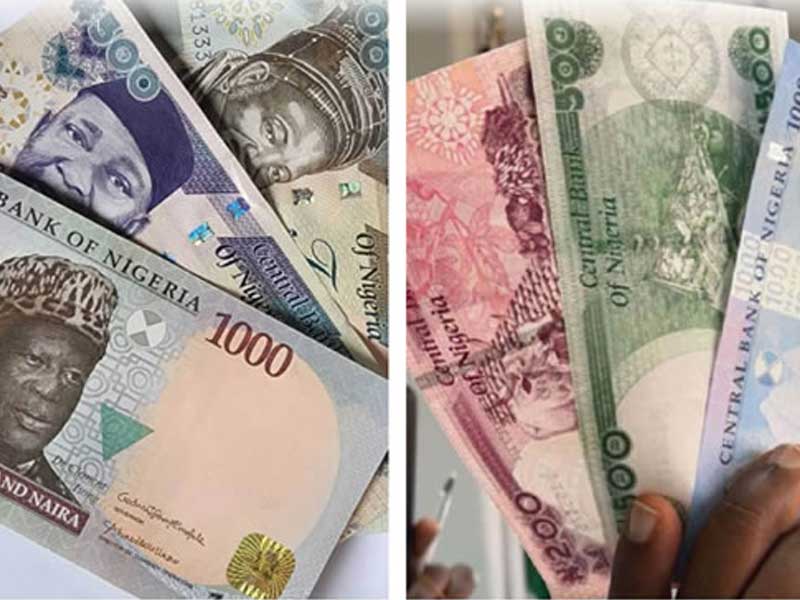

By Kenechukwu Aguolu
The recent rebound of the Naira brought a glimmer of hope to Nigerians amidst the backdrop of economic uncertainty. However, skepticism soon emerged as many questioned the underlying factors driving this increase in value. Concerns arose that the Naira’s rise may have been artificially influenced, either through defending the currency with foreign loans or tapping into the country’s foreign reserves. In response to these speculations, the Central Bank of Nigeria’s Governor vehemently denied any such manipulation, asserting that the Naira’s upward trajectory was a result of the government’s strategic policies aimed at stabilising the currency.
However, in the past few days, the Naira has experienced a decline in value, prompting widespread unease, and clarity regarding the exact causes of its depreciation remains elusive. Various theories have emerged, ranging from the impact of speculative activities in crypto-currency platforms to the Central Bank’s cautious stance amid dwindling foreign reserves. The lack of definitive explanations only serves to exacerbate the prevailing uncertainty surrounding the Naira’s future path, leaving citizens and investors alike on edge.
Despite recent attempts by the Vice President to reassure the public regarding the Naira’s resilience, the potential consequences of a sustained decline cannot be overstated. A loss of faith in the government’s ability to manage the economy could further destabilise an already precarious situation. Moreover, a weakening Naira threatens to reignite a frenzy for foreign currencies, jeopardising financial stability and will also deter much-needed foreign direct investment, thus hindering economic growth. The looming specter of a return to the pre-rebound era of financial instability looms ominously, underscoring the urgent need for decisive action.
Given these pressing challenges, the government must demonstrate swift and resolute leadership to address the root causes of the Naira’s decline and restore confidence in the currency. A comprehensive diagnosis is paramount to identify the underlying factors contributing to the Naira’s weakness. Only by understanding the root causes can effective solutions be devised and implemented to shore up the currency’s value and stabilise the economy.
Furthermore, the government must redouble its efforts to diversify the economy away from its heavy reliance on oil revenues. While this remains a long-term strategy, accelerating the implementation of diversification policies is crucial to reducing Nigeria’s vulnerability to the shockwaves caused by oil price fluctuations. By promoting other income sources such as agriculture, manufacturing, and technology, Nigeria can mitigate the adverse effects of volatile oil prices on its economy and currency.
In conclusion, immediate and decisive action is imperative to prevent the Naira’s decline from spiraling into a full-blown crisis. The government must act swiftly to address the root causes of currency instability, restore trust in the Naira, and pave the way for sustained economic growth and prosperity. The time for action is now, and the stakes could not be higher for the future of Nigeria’s economy.
Opinion
Adeleke v Aregbesola: The price of political treachery
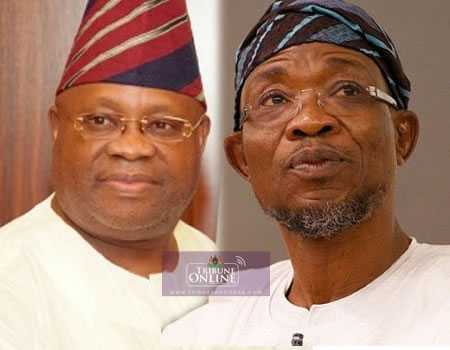

By Dr Jimoh Olorede
Preparatory to the July 2022 governorship election in Osun State, and since thereafter, until recently, the ex-governor and immediate-past Minister of Interior, Ogbeni Rauf Adesoji Aregbesola, a top beneficiary of the All Progressives Congress (APC) party, as a two-term commissioner in Lagos, two-term governor in Osun, and minister consecutively, suddenly became an abettor and a conspiratorial ally to an opposition gubernatorial candidate, Senator Ademola Adeleke, against his party, APC, and his successor, Adegboyega Oyetola, who served as his Chief of Staff, succeeded him as governor, and was seeking a reelection! The gubernatorial election was held, Adeleke won, Oyetola lost, but subsequently appointed as minister, while Aregbesola left the political stage as minister and got back home!
Oyetola’s open and obvious sin for which he must be crucified, and was actually dealt with, at least, in the myopic estimation of Aregbesola and his co-conspirators, was ‘reviewing and reversing his Schools Reclassification Policy’, by which Oyetola actually rekindled people’s hope, and what they perceived as a retrieval of their ‘lost glory and education origin’, with his return and reversal of the changed public schools’ founder-cum-original names and unique uniforms to the status quo. This happens when a government is consent of the governed.
His (Oyetola’s) hidden, how-do-we-say-it sin for which he must be punished was what Ogbeni would term ‘deployment of his magic wand’ with which he was able to pay full salaries of the state workers, which Aregbesola could not, or perhaps did not, given the inherited jugular-strangling and throat-squeezing debt into which he plunged the state. These were Oyetola’s obvious and hidden sins for which the ‘political structure and APC house’ built in Osun by Asiwaju Bola Tinubu, through Aregbesola and others, must be demolished and totally rent asunder.
Since the creation of Osun State, ten people have served as governor, with four military governors and six civilian governors. While the first (military) governor, Leo Segun Ajiborisha, served the shortest term of four months, from 27 August 1991 to 3 January, 1992, Ogbeni Rauf Adesoji Aregbesola so far, served the longest term of eight years as governor, from November 27, 2010 to November 27, 2018. However, within this period of eight years of the longest-serving governor, so many things had happened in and to the state. One of those things was the changing and renaming of the state from Osun State to “State of Osun”. The ex-governor must have seen an error which none of his seven predecessors who had ruled the state before him could see.
He also created and introduced a different state Anthem, Logo, Crest and Flag. Apart from the humongous loan repayment, Oyetola also inherited these “Aregbesola-personified legacies” about which he had to be silent, as it was a moral burden, and rather maintained and sustained the status quo throughout his administration, feigning pretense as if he didn’t see anything wrong just to avoid crisis or rift with Aregbe.
Alas, Governor Ademola Adeleke eventually betrayed his ‘mission-fellow’, an abettor and co-conspirator, Ogbeni Rauf Aregbesola, who maliciously joined forces with him against his own party and successor. He has obliterated all Ogbeni’s known legacies in the state. No sooner had the governor taken the oath of office than he started repealing Aregbesola’s legacies right at the venue of his inauguration. While delivering his inaugural speech, governor Ademola Adeleke publicly said: “Consequently, I hereby issue the following directives which will be backed up with appropriate Executive Orders.
“. . . Three, and immediate reversal to the constitutionally recognized name of our state – Osun State. All government insignia, correspondences, and signage should henceforth, I repeat, should henceforth reflect ‘Osun State, rather than ‘State of Osun’, which is unknown to the Nigerian Constitution.”
Nigerian politics is a treacherous game. There’s no permanent friend or enemy in politics, as politicians deceitfully use and dump each other. Adeleke knew Aregbesola was smart; he consequently cynically stooped to outwit his smartness, and Ogbeni unwittingly misconstrued his betraying kindergarten dancing posture for stupidity.
Also, while Oyetola maintained and sustained the legacy, and retained the nomenclature “OYES” (Osun Youth Empowerment Scheme) as birthed and christened by Aregbesola, governor Ademola Adeleke dissolved the OYES Corps to be renamed after his ‘Imole Youth’. The governor, through his spokesperson, condemned what he referred to as ‘content of the programme’ which, according to him, turned people to grass-cutters and market sweepers. Similarly, on many occasions, I have heard Adeleke-led PDP condemn Aregbesola’s government in the media, bemoaning that he failed to complete any road in eight years, and so on.
Eventually, the scenario turned out to be Adeleke paying Aregbe in his own coins! Based on malice and ill-will, and for his immediate ego satisfaction, Aregbesola sacrificed his party’s future gains, jeopardizing the fortune of many, thinking he was ‘dealing’ with, and whipping Oyetola with political lashes. Paradoxically, as Ogbeni whips, Oyetola laughs while many, including Ogbeni himself, weep as direct recipients of the whipping! As a Yoruba adage says “Papa npara e, o lo np’aja” meaning a tick, like a sheep-ked, is unwittingly ruining itself thinking is undoing its host-dog by sucking its blood.
In June 2023, Ogbeni Aregbesola while speaking at the palace of Ataoja of Osogbo, Oba Jimoh Oyetunji Larooye II, after he had returned to Osun State consequent upon the expiration of his term as minister, said “I was born in Ikare Akoko. It’s surprising that a boy born in Ikare Akoko became a commissioner in Lagos and governor in Osun. That’s the work of God. He used Asiwaju to lead me to the path of success. I thank God who brought me to Lagos through the assistance of Asiwaju Bola Tinubu. He is the architect of my success.” He added that Tinubu directed him to come and take over “my fatherland – Osun State, that it was my next place of assignment.” Can you imagine, Aregbesola saying this after the deed (a grave damage) had been done! This is exactly how traitors behave – joining forces with conspirators to betray their benefactors.
Dr. Olorede, a strategic communication analyst, writes via [email protected]/08111841887
-
capital market2 years ago
Rt.briscoe, FBNH, Others halts negative performance of stock market
-
Finance3 months ago
Court orders Sen. Victor Umeh to repay N136m bank debt to AMCON
-



 Abuja Update2 months ago
Abuja Update2 months agoUNDP, FG partnership needed to achieve inclusion, equity- Minister
-
Abuja Update1 month ago
Banks drive stock market performance with N147bn gain
-



 Business2 weeks ago
Business2 weeks agoTingo Group unveils Tingo Electric, Tingo Cola drink at Lagos launch
-



 Health3 weeks ago
Health3 weeks agoCapacity training will reduce migration of health workers- NPHCDA
-
News4 months ago
Oil thieves sponsoring malicious media campaign against Navy – Spokesman
-



 Infotech1 month ago
Infotech1 month agoWorld Backup Day: NITDA urges Nigerians to ensure backup of data





